 Sign in
Sign in
History
Slate Podcasts
In Slow Burn’s 10th season, host Josh Levin takes you back to a crucial inflection point in American history: the moment between 2000 and 2004 when Fox News first surged to power and a whole bunch of people rose up to try and stop it.You’ll hear from the hosts, reporters, and producers who built Fox News, many who’ve never spoken publicly. You’ll also hear from Fox’s biggest antagonists—the political operatives, journalists, and comedians who attacked it, investigated it, and tried to mock it into submission. And you’ll hear from Fox’s victims, who are still coming to terms with how a cable news channel upended their lives.
Want more Slow Burn? Join Slate Plus to immediately access all past seasons and episodes of Slow Burn (and your other favorite Slate podcasts) completely ad-free. Plus, you’ll unlock subscriber-exclusive bonus episodes that bring you behind-the-scenes on the making of the show. Subscribe now on Apple Podcasts by clicking “Subscribe” at the top of our show page. Or, visit slate.com/slowburnplus to get access wherever you listen.
Season 9: Gays Against Briggs
A nationwide moral panic, a California legislator who rode the anti-gay wave, and the LGBTQ+ people who stepped up and came out to try and stop him.
Season 8: Becoming Justice Thomas
Where Clarence Thomas came from, how he rose to power, and how he’s brought the rest of us along with him, whether we like it or not. Winner of the Podcast of the Year at the 2024 Ambies Awards.
Season 7: Roe v. Wade
The women who fought for legal abortion, the activists who pushed back, and the justices who thought they could solve the issue for good. Winner of Apple Podcasts Show of the Year in 2022.
Season 6: The L.A. Riots
How decades of police brutality, a broken justice system, and a video tape set off six days of unrest in Los Angeles.
Season 5: The Road to the Iraq War
Eighteen months after 9/11, the United States invaded a country that had nothing to do with the attacks. Who’s to blame? And was there any way to stop it?
Season 4: David Duke
America’s most famous white supremacist came within a runoff of controlling Louisiana. How did David Duke rise to power? And what did it take to stop him?
Season 3: Biggie and Tupac
How is it that two of the most famous performers in the world were murdered within a year of each other—and their killings were never solved?
Season 2: The Clinton Impeachment
A reexamination of the scandals that nearly destroyed the 42nd president and forever changed the life of a former White House intern.
Season 1: Watergate
What did it feel like to live through the scandal that brought down President Nixon?

The L.A. Riots | 3. The Chief
In 1991, Daryl Gates was the face of the LAPD. Over the course of his 13-year tenure as chief, he had built his police department into a paramilitary-style force that enforced the racial boundaries of the city.
Rodney King’s beating had exposed the brutality of Gates’ police force to the city. In the weeks after the video aired, L.A.’s most powerful institutions joined together to call for an end to Gates’ career and the style of policing that had resulted in King’s beating.
But even with much of the city’s political leadership unified against him, Gates was ready for a fight.
Want more Slow Burn? Subscribe to Slate Plus to immediately access all episodes of Slow Burn (and your other favorite Slate podcasts) completely ad-free. Plus, you’ll unlock subscriber-exclusive bonus episodes that bring you behind-the-scenes on the making of the show. Subscribe now on Apple Podcasts by clicking “Try Free” at the top of our show page. Or, visit slate.com/slowburnplus to get access wherever you listen.
Season 6 of Slow Burn is produced by Joel Anderson, Jayson De Leon, Ethan Brooks, Sophie Summergrad, and Jasmine Ellis.
Mixing by Merritt Jacob.
Learn more about your ad choices. Visit megaphone.fm/adchoices
50:0817/11/2021
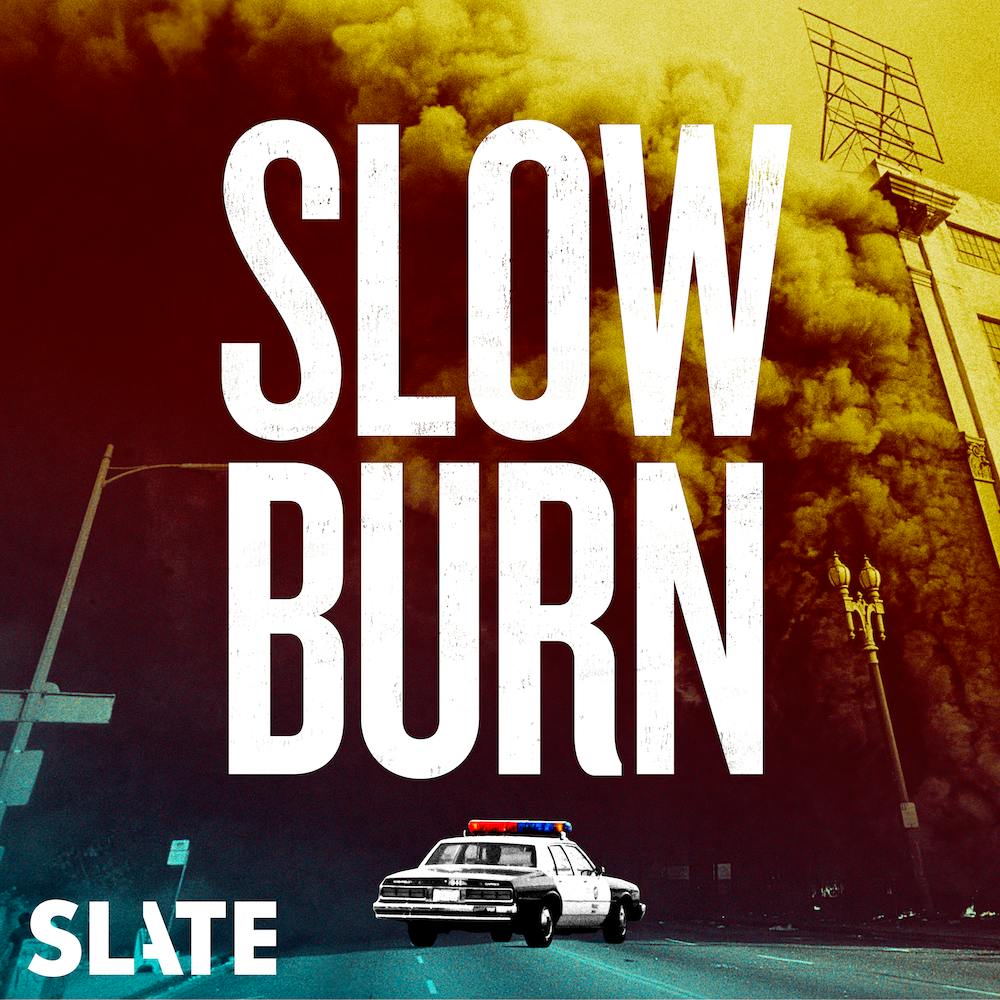
The L.A. Riots | 2. No Justice
In March 1991, the video of the Rodney King beating was national news. The LAPD was under intense scrutiny and many white Americans were seeing a side of policing they’d never seen before.
Just a few days after George Holliday’s tape aired, the residents of South Central, Los Angeles were forced to confront yet another devastating act of violence: The killing of 15-year-old Latasha Harlins.
How did a deadly altercation at a convenience store set off a battle between Los Angeles’ Black residents and its immigrant shopkeepers? And how did the justice system respond?
Want more Slow Burn? Subscribe to Slate Plus to immediately access all episodes of Slow Burn (and your other favorite Slate podcasts) completely ad-free. Plus, you’ll unlock subscriber-exclusive bonus episodes that bring you behind-the-scenes on the making of the show. Subscribe now on Apple Podcasts by clicking “Try Free” at the top of our show page. Or, visit slate.com/slowburnplus to get access wherever you listen.
Season 6 of Slow Burn is produced by Joel Anderson, Jayson De Leon, Ethan Brooks, Sophie Summergrad, and Jasmine Ellis.
Mixing by Merritt Jacob.
Learn more about your ad choices. Visit megaphone.fm/adchoices
50:3810/11/2021

The L.A. Riots | 1. The Tape
On the night of March 2nd, 1991, at a remote intersection just outside of L.A., four police officers surrounded an unarmed Black man. They struck him 56 times with their batons before arresting him.
Across the street, standing on his second-floor balcony, a bystander named George Holliday recorded the scene on his home video camera.
This is what happened after the camera stopped rolling.
Want more Slow Burn? Subscribe to Slate Plus to immediately access all episodes of Slow Burn (and your other favorite Slate podcasts) completely ad-free. Plus, you’ll unlock subscriber-exclusive bonus episodes that bring you behind-the-scenes on the making of the show. Subscribe now on Apple Podcasts by clicking “Try Free” at the top of our show page. Or, visit slate.com/slowburnplus to get access wherever you listen.
Season 6 of Slow Burn is produced by Joel Anderson, Jayson De Leon, Ethan Brooks, Sophie Summergrad, and Jasmine Ellis.
Mixing by Merritt Jacob.
Learn more about your ad choices. Visit megaphone.fm/adchoices
45:0903/11/2021

One Year: Jesus on a Tortilla
After Maria Rubio saw Jesus on a tortilla, her family got besieged by believers and gawkers and the national press. But for the Rubios, the tortilla wasn’t just a public spectacle. It was the miracle that changed their family. And decades later, they’re still reckoning with how that tortilla upended everything.
One Year is produced by Josh Levin, Evan Chung, and Madeline Ducharme. Mixing by Merritt Jacob.
To support this show, subscribe to One Year on Apple, Spotify, or wherever you listen.
Learn more about your ad choices. Visit megaphone.fm/adchoices
55:2520/08/2021

One Year: Roots: The Saga of Alex Haley
Alex Haley’s Roots displayed the brutal realities of slavery to more than 100 million Americans. The book and mini-series also made a bold claim: that Haley was the first Black American to trace his lineage all the way back to Africa, and to a specific ancestor captured into slavery. What would it mean, for Haley and America, if he hadn’t found what he said he’d found?
To support this show, subscribe to One Year on Apple, Spotify, or wherever you listen.
Learn more about your ad choices. Visit megaphone.fm/adchoices
57:2412/08/2021

One Year: Mr. Marijuana and the Drug Czar
America’s top weed evangelist and the nation’s drug czar shared the same goal: to loosen up the country’s marijuana laws. In 1977, everything was trending their way—until a blowout Christmas party destroyed their plans, and transformed the future of marijuana in the United States.
One Year is produced by Josh Levin, Evan Chung, and Madeline Ducharme. Mixing by Merritt Jacob.
To support this show, subscribe to One Year on Apple, Spotify, or wherever you listen.
Learn more about your ad choices. Visit megaphone.fm/adchoices
50:5310/08/2021

One Year: Elvis, the Pledge, and Extraterrestrials
Three stories from one day in August 1977. Elvis Presley dies, and the National Enquirer goes after the ultimate tabloid scoop: a photo of the King in his coffin. A New Jersey high schooler becomes a pariah when she refuses to stand for the Pledge of Allegiance. Astronomers in Ohio get a mysterious signal from outer space—could it be a message from aliens?
One Year is produced by Josh Levin, Evan Chung, and Madeline Ducharme. Mixing by Merritt Jacob.
To support this show, subscribe to One Year on Apple, Spotify, or wherever you listen.
Learn more about your ad choices. Visit megaphone.fm/adchoices
59:5405/08/2021

One Year: The Miracle Cure
Medical authorities said that Laetrile was dangerous quackery. It became a sensation anyway. Diana Green saw this drug made from apricot pits as her son Chad’s best chance to survive leukemia. Her shocking actions, and the little boy affected by them, became the focus of a heated national debate over freedom of medical choice.
One Year is produced by Josh Levin, Evan Chung, and Madeline Ducharme. Mixing by Merritt Jacob.
To support this show, subscribe to One Year on Apple, Spotify, or wherever you listen.
Learn more about your ad choices. Visit megaphone.fm/adchoices
01:02:1402/08/2021

One Year: Mary Shane's Rookie Season
Mary Shane made history with the Chicago White Sox, becoming the first woman hired as a legitimate major-league baseball announcer. But in 1977, she had to fight to be taken seriously in one of America’s most sexist industries.
One Year is produced by Josh Levin, Evan Chung, and Madeline Ducharme. Mixing by Merritt Jacob.
To support this show, subscribe to One Year on Apple, Spotify, or wherever you listen.
Learn more about your ad choices. Visit megaphone.fm/adchoices
54:3229/07/2021

Decoder Ring: The Sign Painter
Decoder Ring is Slate's show about cracking cultural mysteries. In each episode, host Willa Paskin takes a cultural question, object, or habit, examines its history, and tries to figure out what it means and why it matters.
This episode introduces you to Ilona Granet, who was a New York art-scene fixture who won the praise of the art world when she put up anti-harassment street signs in lower Manhattan in the mid- 1980s. Her career seemed like a sure thing, but three decades on, and so much more art later, it still hasn’t materialized, even as her contemporaries are now hanging in museums. This episode is not about the familiar myth of making it, but the mystery of not making it. What happens, to an artist—to anyone—when they’re good enough, but that’s not enough?
If you like the show, subscribe to Decoder Ring on Apple, Spotify, or wherever you listen.
Learn more about your ad choices. Visit megaphone.fm/adchoices
01:02:0622/07/2021

One Year: Anita Bryant's War on Gay Rights
Slate's new podcast One Year and will introduce you to people and ideas that changed American history--one year at a time. The show is hosted by Josh Levin, Slate's national editor and host of Slow Burn Season 4. And our first season covers 1977: a year when gay rights hung in the balance, Roots dominated the airwaves, and Jesus appeared on a tortilla.
In this show, we’ll focus on key moments that transformed politics, culture, science, religion, and more. This episode you’re about to hear will take you into a courtroom in Miami, Florida, where a local fight over gay rights was about to become a huge national standoff, one with life-altering stakes for millions of Americans. And at the center of it all was a pop singer and orange juice spokesperson named Anita Bryant.
How does the nation’s past shape our present? Subscribe to One Year on Apple, Spotify, or wherever you listen.
Learn more about your ad choices. Visit megaphone.fm/adchoices
01:05:5309/07/2021

The Road to the Iraq War | 8. Shock and Awe
This episode is member-exclusive. Listen to it now by subscribing to Slate Plus. By joining, not only will you unlock exclusive Slow Burn episodes, but you’ll also access ad-free listening across all your favorite Slate podcasts. Subscribe now on Apple Podcasts by clicking “Try Free” at the top of our show page. Or, visit slate.com/slowburnplus to get access wherever you listen.
The Bush administration didn’t just fail to plan for post-war Iraq. Before and during the invasion, they made choices that compounded the mistake of going to war. Those decisions had lasting consequences for the world and for the Iraqi people. Who’s most responsible for that tragedy?
Season 5 of Slow Burn is produced by Noreen Malone, Jayson De Leon, and Sophie Summergrad. Mixing by Merritt Jacob.
Learn more about your ad choices. Visit megaphone.fm/adchoices
10:5416/06/2021

The Road to the Iraq War | 7. Judy
This episode is member-exclusive. Listen to it now by subscribing to Slate Plus. By joining, not only will you unlock exclusive Slow Burn episodes, but you’ll also access ad-free listening across all your favorite Slate podcasts. Subscribe now on Apple Podcasts by clicking “Try Free” at the top of our show page. Or, visit slate.com/slowburnplus to get access wherever you listen.
In the months before the invasion of Iraq, the media mostly backed the Bush administration’s narrative about weapons of mass destruction. No reporter was more influential on that beat than the New York Times' Judith Miller.
How did she get the story so wrong—and why was she the only person to take the fall?
Season 5 of Slow Burn is produced by Noreen Malone, Jayson De Leon, and Sophie Summergrad. Mixing by Merritt Jacob.
Learn more about your ad choices. Visit megaphone.fm/adchoices
06:4709/06/2021

The Road to the Iraq War | 6. Big, if True
On Feb. 5, 2003, Secretary of State Colin Powell went to the United Nations to make the Bush administration’s closing argument for war with Iraq. Powell didn’t know it at the time, but one major piece of intelligence he cited came from a shady source—a man code-named Curveball.
How did Curveball’s bad information make it into Powell’s speech? And why did no one listen when a woman from the CIA tried to warn everyone?
Want more Slow Burn? Subscribe to Slate Plus to immediately access all episodes of Slow Burn (and your other favorite Slate podcasts) completely ad-free. Plus, you’ll unlock subscriber-exclusive bonus episodes that bring you behind-the-scenes on the making of the show. Subscribe now on Apple Podcasts by clicking “Try Free” at the top of our show page. Or, visit slate.com/slowburnplus to get access wherever you listen.
Season 5 of Slow Burn is produced by Noreen Malone, Jayson De Leon, and Sophie Summergrad. Mixing by Merritt Jacob.
Learn more about your ad choices. Visit megaphone.fm/adchoices
46:0902/06/2021

The Road to the Iraq War | 5. Four Dicks (and Vice President Cheney)
Four men in Congress—two from each party—helped determine whether President George W. Bush would be given the authority to invade Iraq. All of them were named Dick. Which of these Dicks scrutinized the case for war the most closely? And who was making obvious political calculations?
Want more Slow Burn? Subscribe to Slate Plus to immediately access all episodes of Slow Burn (and your other favorite Slate podcasts) completely ad-free. Plus, you’ll unlock subscriber-exclusive bonus episodes that bring you behind-the-scenes on the making of the show. Subscribe now on Apple Podcasts by clicking “Try Free” at the top of our show page. Or, visit slate.com/slowburnplus to get access wherever you listen.
Season 5 of Slow Burn is produced by Noreen Malone, Jayson De Leon, and Sophie Summergrad. Mixing by Merritt Jacob.
Learn more about your ad choices. Visit megaphone.fm/adchoices
49:5826/05/2021

Extra: More on the Road to Iraq
This week, we're highlighting a few excerpts from this season's Slate Plus episodes—interviews with Ann Curry, Slate writers and editors who blogged about the war in 2003, and people who personally knew Ahmad Chalabi.
Want more Slow Burn? Subscribe to Slate Plus to immediately access all episodes of Slow Burn (and your other favorite Slate podcasts) completely ad-free. Plus, you’ll unlock subscriber-exclusive bonus episodes that bring you behind-the-scenes on the making of the show. Subscribe now on Apple Podcasts by clicking “Try Free” at the top of our show page. Or, visit slate.com/slowburnplus to get access wherever you listen.
Learn more about your ad choices. Visit megaphone.fm/adchoices
19:4119/05/2021

The Road to the Iraq War | 4. Fighting Words
In the year leading up the invasion, George W. Bush sketched his justification for the war: good vs. evil, us vs. them. The president wasn’t interested in fleshing out the details beyond that, but lots of other people were.
How did intellectuals, on both the right and left, help bolster the Bush administration’s case for war? And how much responsibility should they bear for one of America’s deadliest mistakes?
Want more Slow Burn? Subscribe to Slate Plus to immediately access all episodes of Slow Burn (and your other favorite Slate podcasts) completely ad-free. Plus, you’ll unlock subscriber-exclusive bonus episodes that bring you behind-the-scenes on the making of the show. Subscribe now on Apple Podcasts by clicking “Try Free” at the top of our show page. Or, visit slate.com/slowburnplus to get access wherever you listen.
Season 5 of Slow Burn is produced by Noreen Malone, Jayson De Leon, and Sophie Summergrad. Mixing by Merritt Jacob.
Learn more about your ad choices. Visit megaphone.fm/adchoices
50:0612/05/2021

The Road to the Iraq War | 3. Mushroom Clouds
To start a war of choice, you need a casus belli—a case for war. Why did the Bush administration settle on weapons of mass destruction as their case for war? And how did they make that case to the American people?
Want more Slow Burn? Subscribe to Slate Plus to immediately access all episodes of Slow Burn (and your other favorite Slate podcasts) completely ad-free. Plus, you’ll unlock subscriber-exclusive bonus episodes that bring you behind-the-scenes on the making of the show. Subscribe now on Apple Podcasts by clicking “Try Free” at the top of our show page. Or, visit slate.com/slowburnplus to get access wherever you listen.
Season 5 of Slow Burn is produced by Noreen Malone, Jayson De Leon, and Sophie Summergrad. Mixing by Merritt Jacob.
Learn more about your ad choices. Visit megaphone.fm/adchoices
47:4805/05/2021

The Road to the Iraq War | 2. Terror
Just hours after 9/11, American decision makers had already started thinking about attacking Iraq. When the anthrax attacks began a month later, those ideas went into overdrive. Did Iraq have anything to do with mailing anthrax letters? Did it matter?
Want more Slow Burn? Subscribe to Slate Plus to immediately access all episodes of Slow Burn (and your other favorite Slate podcasts) completely ad-free. Plus, you’ll unlock subscriber-exclusive bonus episodes that bring you behind-the-scenes on the making of the show. Subscribe now on Apple Podcasts by clicking “Try Free” at the top of our show page. Or, visit slate.com/slowburnplus to get access wherever you listen.
Season 5 of Slow Burn is produced by Noreen Malone, Jayson De Leon, and Sophie Summergrad. Mixing by Merritt Jacob.
Learn more about your ad choices. Visit megaphone.fm/adchoices
49:4628/04/2021
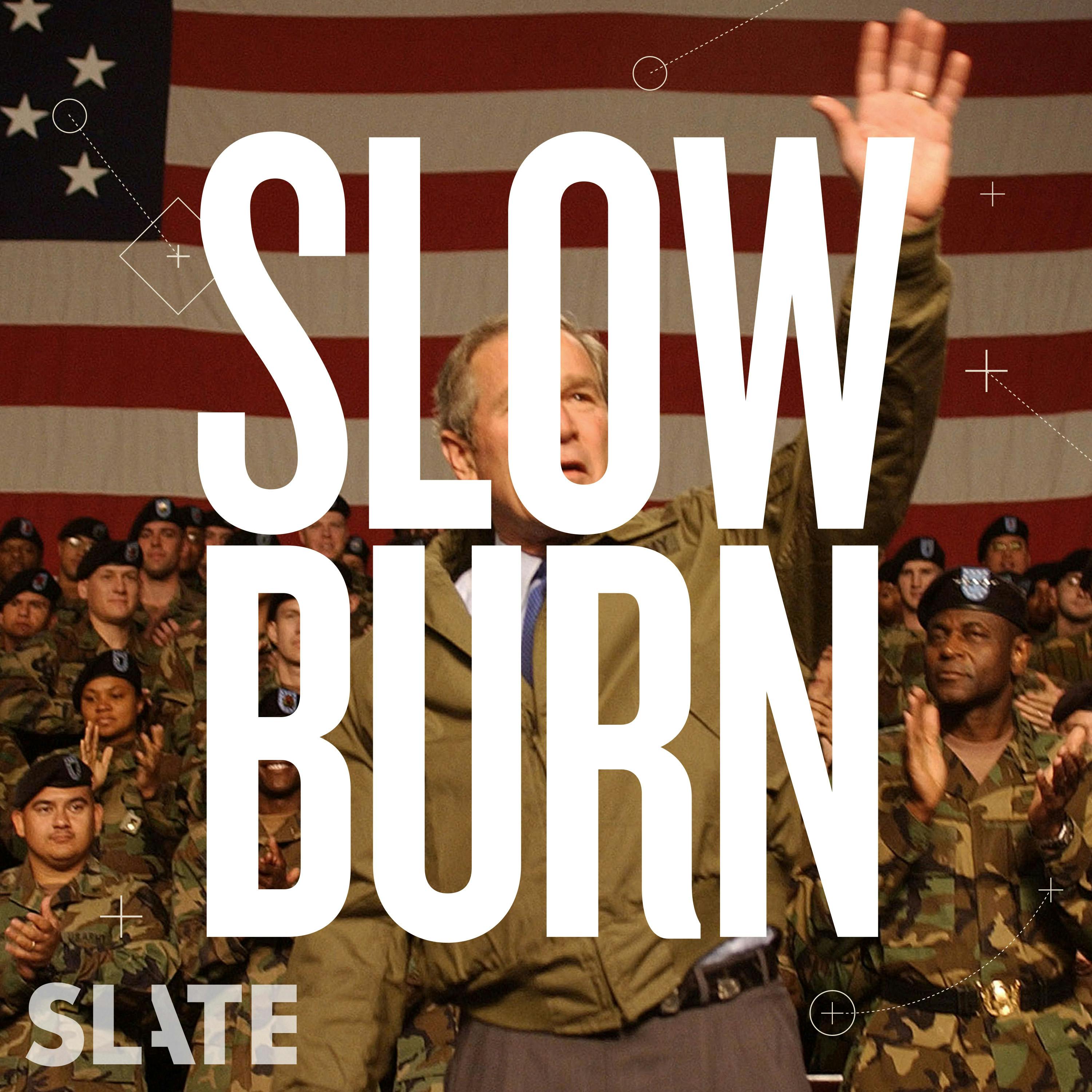
The Road to the Iraq War | 1. The Exile
Eighteen years have passed since the United States invaded Iraq. It’s a war that killed hundreds of thousands of people and destroyed America’s credibility on the world stage. How much can that war be traced to one Iraqi exile’s longstanding quest to return to Baghdad?
Want more Slow Burn? Subscribe to Slate Plus to immediately access all episodes of Slow Burn (and your other favorite Slate podcasts) completely ad-free. Plus, you’ll unlock subscriber-exclusive bonus episodes that bring you behind-the-scenes on the making of the show. Subscribe now on Apple Podcasts by clicking “Try Free” at the top of our show page. Or, visit slate.com/slowburnplus to get access wherever you listen.
Season 5 of Slow Burn is produced by Noreen Malone, Jayson De Leon, and Sophie Summergrad. Mixing by Merritt Jacob.
Production help from Margaret Kelley.
Learn more about your ad choices. Visit megaphone.fm/adchoices
53:5521/04/2021

Introducing: I Spy
We're excited to introduce you to I Spy, a production of Foreign Policy. Each week on I Spy, a former intelligence operative from somewhere around the world tells the story of a single mission. They've featured guests from the CIA, Mossad, MI5, the KGB, and more. The host is three-time Emmy winner Margo Martindale, who played Claudia the KGB handler on FX’s hit show The Americans.
In this first episode of season 3, DEA special agent Steve Murphy describes his role in the hunt for narco-terrorist Pablo Escobar in Colombia in the early 1990s. This is part one of a two-part episode. To hear part 2, make sure to look for I Spy wherever you get your podcasts.
Learn more about your ad choices. Visit megaphone.fm/adchoices
28:5429/01/2021

Extra: What We Can Learn From 1991
A few excerpts from Season 4's bonus interviews, and a special Slow Burn announcement.
Want more Slow Burn? Subscribe to Slate Plus to immediately access all episodes of Slow Burn (and your other favorite Slate podcasts) completely ad-free. Plus, you’ll unlock subscriber-exclusive bonus episodes that bring you behind-the-scenes on the making of the show. Subscribe now on Apple Podcasts by clicking “Try Free” at the top of our show page. Or, visit slate.com/slowburnplus to get access wherever you listen.
Learn more about your ad choices. Visit megaphone.fm/adchoices
36:3929/10/2020

David Duke | 6. A Concerned Citizen
This episode is member-exclusive. Listen to it now by subscribing to Slate Plus. By joining, not only will you unlock exclusive Slow Burn episodes, but you’ll also access ad-free listening across all your favorite Slate podcasts. Subscribe now on Apple Podcasts by clicking “Try Free” at the top of our show page. Or, visit slate.com/slowburnplus to get access wherever you listen.
In the fall of 1991, David Duke looked like a real threat to become the governor of Louisiana.
On the sixth and final episode of Slow Burn's fourth season: What arguments did David Duke's opponents make? Who did they hope to persuade? And what did it mean, in those four weeks in 1991, to stand up and be counted?
Season 4 of Slow Burn is produced by Josh Levin and Christopher Johnson. Mixing by Paul Mounsey. Slow Burn’s production assistant is Madeline Ducharme and Sophie Summergrad is the podcast’s assistant producer.
Learn more about your ad choices. Visit megaphone.fm/adchoices
10:3722/07/2020

David Duke | 5. The Road to Hell
This episode is member-exclusive. Listen to it now by subscribing to Slate Plus. By joining, not only will you unlock exclusive Slow Burn episodes, but you’ll also access ad-free listening across all your favorite Slate podcasts. Subscribe now on Apple Podcasts by clicking “Try Free” at the top of our show page. Or, visit slate.com/slowburnplus to get access wherever you listen.
Edwin Edwards was a towering force in Louisiana politics. Buddy Roemer dethroned him and promised to modernize the state. In 1991, David Duke challenged both of them—and was soon on the verge of the biggest victory of his life.
In Episode 5 of Slow Burn: How a Louisiana governor’s race became one of the most consequential elections in modern American history.
Season 4 of Slow Burn is produced by Josh Levin and Christopher Johnson. Mixing by Paul Mounsey. Slow Burn’s production assistant is Madeline Ducharme and Sophie Summergrad is the podcast’s assistant producer.
Learn more about your ad choices. Visit megaphone.fm/adchoices
14:5315/07/2020

David Duke | 4. A Silent Army
David Duke wasn’t content being a state representative. He wanted to go national, and in 1990 he expanded his base of white voters to try to attain that goal.
In Episode 4 of Slow Burn: How David Duke made himself a political sensation—and the message that his supporters sent when they cast their ballots.
Want more Slow Burn? Subscribe to Slate Plus to immediately access all episodes of Slow Burn (and your other favorite Slate podcasts) completely ad-free. Plus, you’ll unlock subscriber-exclusive bonus episodes that bring you behind-the-scenes on the making of the show. Subscribe now on Apple Podcasts by clicking “Try Free” at the top of our show page. Or, visit slate.com/slowburnplus to get access wherever you listen.
Season 4 of Slow Burn is produced by Josh Levin and Christopher Johnson. Mixing by Paul Mounsey. Slow Burn’s production assistant is Madeline Ducharme and Sophie Summergrad is the podcast’s assistant producer.
Learn more about your ad choices. Visit megaphone.fm/adchoices
53:0208/07/2020
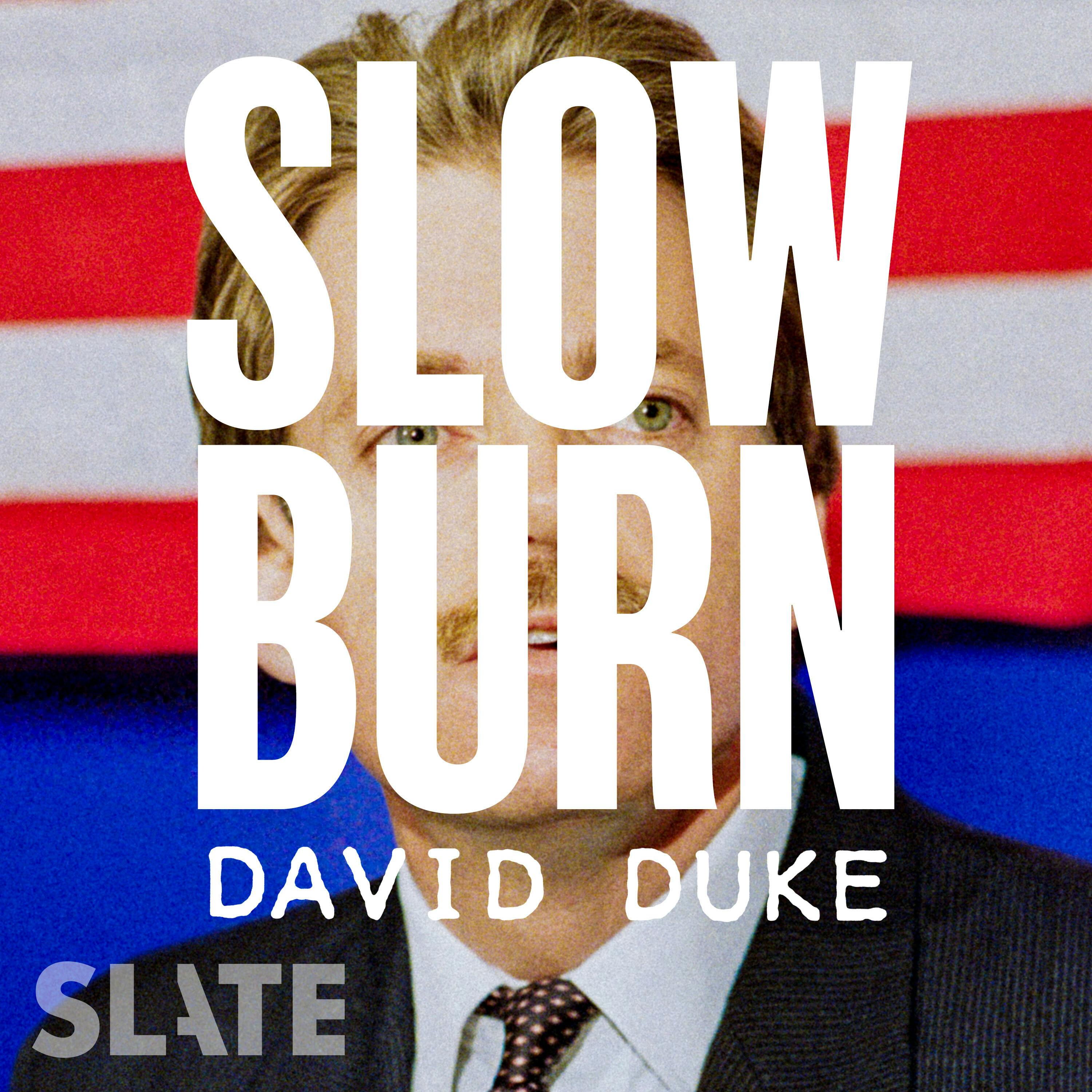
Cold Call
In 1989, a Black 12-year-old girl in New Orleans found the David Duke phenomenon, and Duke himself, hard to comprehend. So she called Duke on the phone to ask him some questions.
In this Slow Burn interlude: how a budding journalist outdid the professionals. Plus, why we won’t be interviewing David Duke for our series.
Season 4 of Slow Burn is produced by Josh Levin and Christopher Johnson. Mixing by Paul Mounsey. Slow Burn’s production assistant is Madeline Ducharme and Sophie Summergrad is the podcast’s assistant producer.
Learn more about your ad choices. Visit megaphone.fm/adchoices
27:5701/07/2020

David Duke | 3. The Nazi and the Republicans
In 1989, David Duke got a foothold in American politics. To build on that victory, he’d have to fend off a Republican official determined to bring him down.
In the third episode of our series: the people who tried to stop David Duke’s rise, and the ones who accommodated him.
Want more Slow Burn? Subscribe to Slate Plus to immediately access all episodes of Slow Burn (and your other favorite Slate podcasts) completely ad-free. Plus, you’ll unlock subscriber-exclusive bonus episodes that bring you behind-the-scenes on the making of the show. Subscribe now on Apple Podcasts by clicking “Try Free” at the top of our show page. Or, visit slate.com/slowburnplus to get access wherever you listen.
Season 4 of Slow Burn is produced by Josh Levin and Christopher Johnson. Mixing by Paul Mounsey. Slow Burn’s production assistant is Madeline Ducharme and Sophie Summergrad is the podcast’s assistant producer.
Learn more about your ad choices. Visit megaphone.fm/adchoices
56:2824/06/2020
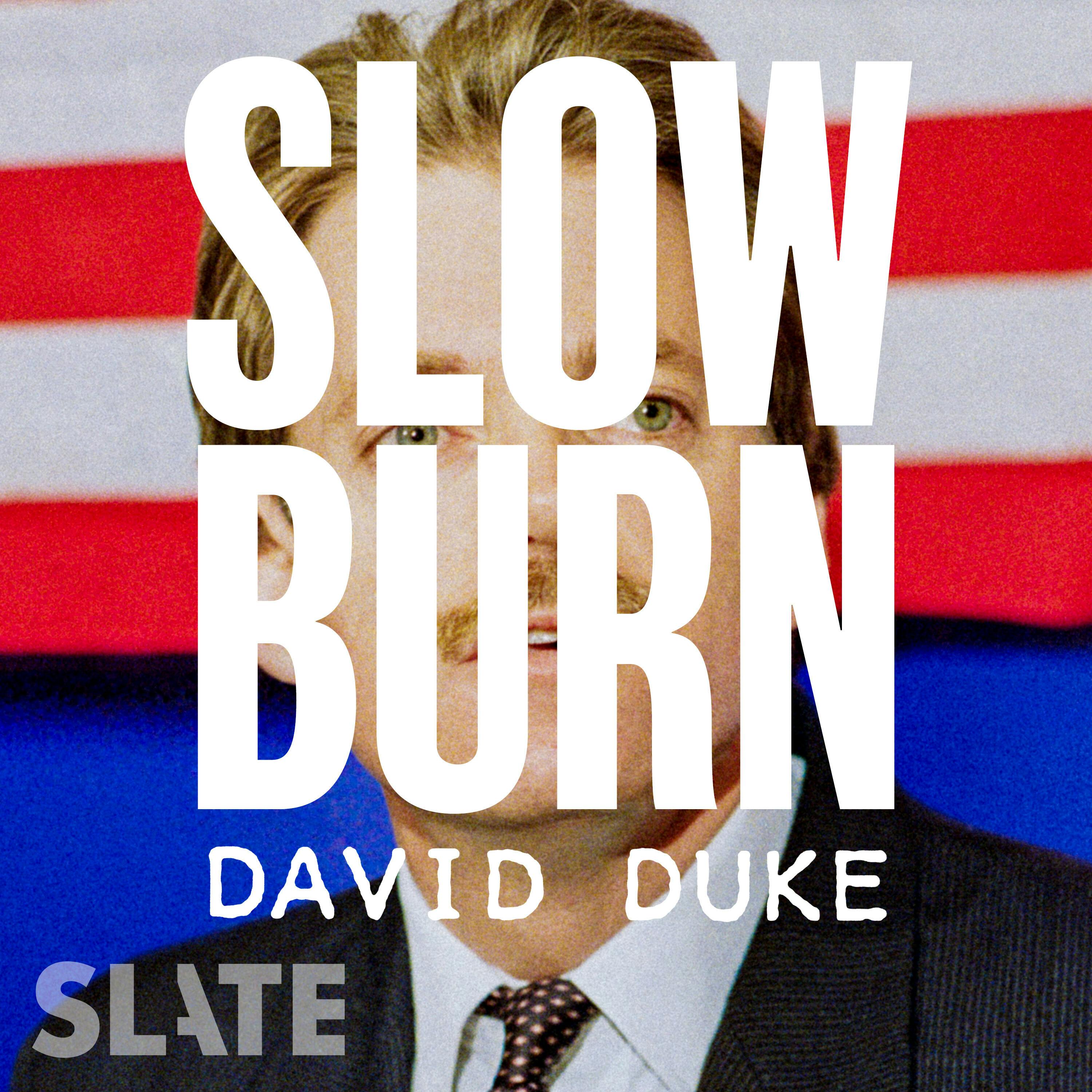
David Duke | 2. Robe and Ritual
David Duke dreamed of becoming the charismatic leader who’d bring racism to the masses. He tried to make that dream a reality by seizing on America’s most powerful symbol of white supremacist terror.
On the second episode of Slow Burn’s fourth season: what David Duke’s years as a leader in the Ku Klux Klan reveal about his beliefs and ambitions, and why Duke decided to leave the Klan behind.
Want more Slow Burn? Subscribe to Slate Plus to immediately access all episodes of Slow Burn (and your other favorite Slate podcasts) completely ad-free. Plus, you’ll unlock subscriber-exclusive bonus episodes that bring you behind-the-scenes on the making of the show. Subscribe now on Apple Podcasts by clicking “Try Free” at the top of our show page. Or, visit slate.com/slowburnplus to get access wherever you listen.
Season 4 of Slow Burn is produced by Josh Levin and Christopher Johnson. Mixing by Paul Mounsey. Slow Burn’s production assistant is Madeline Ducharme and Sophie Summergrad is the podcast’s assistant producer.
Learn more about your ad choices. Visit megaphone.fm/adchoices
53:1417/06/2020

David Duke | 1. White Knight
In the first half of the 1980s, it looked like David Duke’s career as a professional racist was over. But the former Ku Klux Klan leader had a comeback plan: He was going to keep quiet about his most hateful beliefs—and run for the Louisiana House of Representatives.
On the first episode of Slow Burn’s fourth season: the campaign that changed David Duke’s life, and that made him a threat to take control of Louisiana.
Want more Slow Burn? Subscribe to Slate Plus to immediately access all episodes of Slow Burn (and your other favorite Slate podcasts) completely ad-free. Plus, you’ll unlock subscriber-exclusive bonus episodes that bring you behind-the-scenes on the making of the show. Subscribe now on Apple Podcasts by clicking “Try Free” at the top of our show page. Or, visit slate.com/slowburnplus to get access wherever you listen.
Season 4 of Slow Burn is produced by Josh Levin and Christopher Johnson. Mixing by Paul Mounsey. Slow Burn’s production assistant is Madeline Ducharme and Sophie Summergrad is the podcast’s assistant producer.
Learn more about your ad choices. Visit megaphone.fm/adchoices
51:3110/06/2020
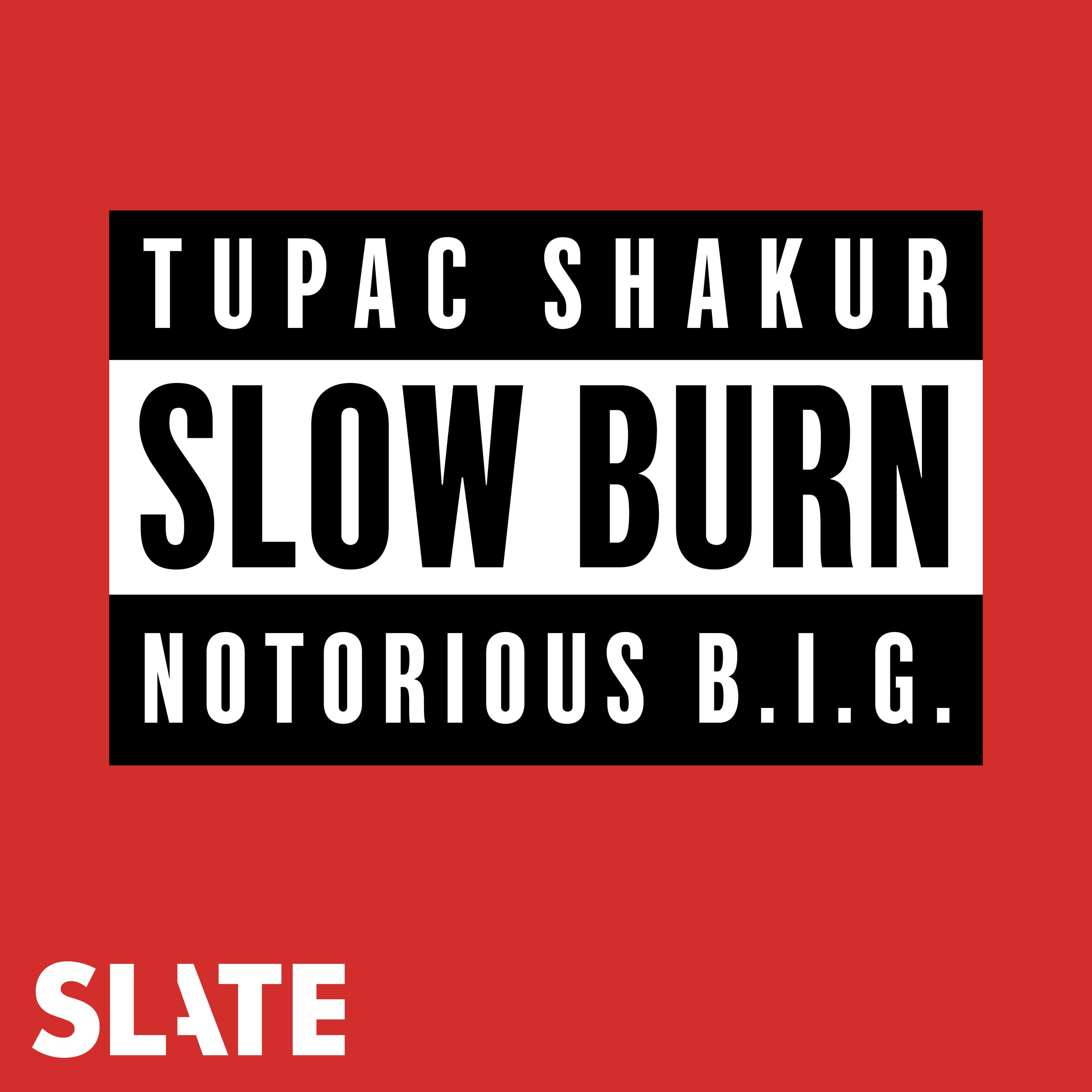
Live: Party & Bullshit
A special edition of Slow Burn features Joel Anderson live on stage, with legendary producers Nashiem Myrick and Easy Moe Bee, and Reverend Conrad Tillard, known in the 90s as "The Hip Hop Minister." Plus, a story from the season 3 cutting room floor.
Want more Slow Burn? Subscribe to Slate Plus to immediately access all episodes of Slow Burn (and your other favorite Slate podcasts) completely ad-free. Plus, you’ll unlock subscriber-exclusive bonus episodes that bring you behind-the-scenes on the making of the show. Subscribe now on Apple Podcasts by clicking “Try Free” at the top of our show page. Or, visit slate.com/slowburnplus to get access wherever you listen.
Learn more about your ad choices. Visit megaphone.fm/adchoices
56:3418/03/2020

Announcement: Slow Burn's Watergate Season on TV
Slow Burn's Watergate season is now a TV docu-series, premiering Feb. 16 on Epix. Read more about it in this interview with host Leon Neyfakh.
Learn more about your ad choices. Visit megaphone.fm/adchoices
01:5614/02/2020

Introducing: Broken Record
Hey Slow Burn listeners. We have something special for you this week. It's an episode of Broken Record, a music podcast from Pushkin Industries, co-hosted by Malcolm Gladwell and music producer Rick Rubin. In the episode, Malcolm and Rick talk to Questlove about his memories of the MOVE police bombing in Philly, the music of his childhood, and Quest gets behind the drums to show the evolution of his playing.
Being the music lover he is, Questlove can't help but turn the tables to ask Rick about his own Hip Hop history: working on the Beastie Boys' first album, License to Ill, and LL Cool J's first album, Radio. Then it all culminates in one of the best Obama stories ever. You can subscribe to Broken Record wherever you get your podcasts, and see some amazing studio session photos on Instagram, @TheBrokenRecordPod.
Learn more about your ad choices. Visit megaphone.fm/adchoices
52:3327/12/2019
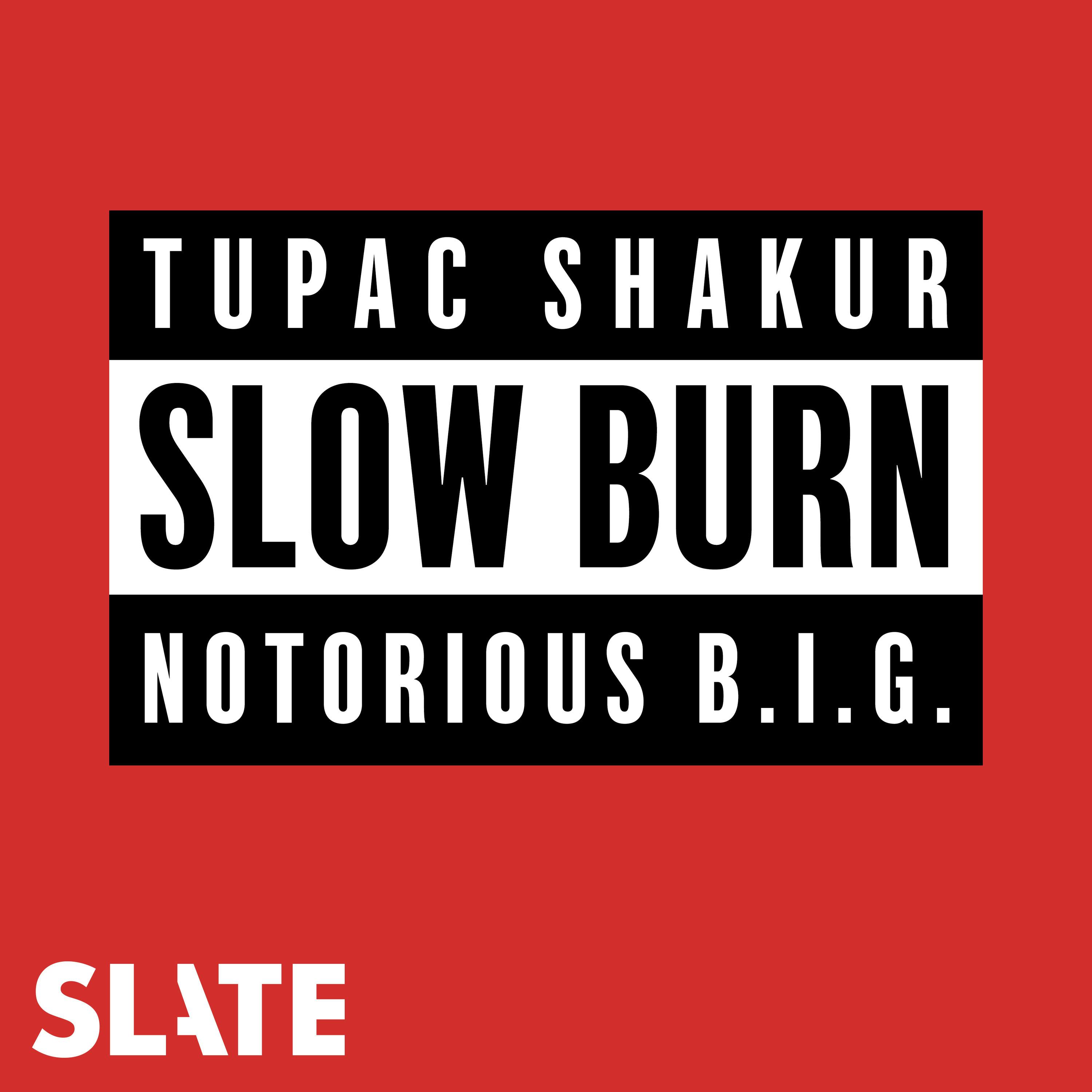
Biggie and Tupac | Epilogue: Got a Story to Tell
Slate Plus members get a bonus episode of Slow Burn every week. This is a preview of the bonus episodes released this season:—interviews with Slow Burn host Joel Anderson and producer Christopher Johnson about the making of the series, and extended interviews they conducted with Tupac's attorney Shawn Holley, hip-hop journalist Matty C, and Biggie biographer Cheo Hodari Coker.
Want more Slow Burn? Subscribe to Slate Plus to immediately access all episodes of Slow Burn (and your other favorite Slate podcasts) completely ad-free. Subscribe now on Apple Podcasts by clicking “Try Free” at the top of our show page. Or, visit slate.com/slowburnplus to get access wherever you listen.
Learn more about your ad choices. Visit megaphone.fm/adchoices
51:4320/12/2019

Biggie and Tupac | 8. Dead Wrong
This episode is member-exclusive. Listen to it now by subscribing to Slate Plus. By joining, not only will you unlock exclusive Slow Burn episodes, but you’ll also access ad-free listening across all your favorite Slate podcasts. Subscribe now on Apple Podcasts by clicking “Try Free” at the top of our show page. Or, visit slate.com/slowburnplus to get access wherever you listen.
Questions have swirled around the murders of Tupac Shakur and Biggie Smalls ever since their deaths. Who killed them, and why? How come no one was ever charged in either case? Is Tupac still alive and hiding out somewhere?
On the final episode of the season, we look at the investigations into the deaths of two rap legends and the competing theories of their cases. We also explore their enormous legacies, and what hip-hop lost when they died.
Learn more about your ad choices. Visit megaphone.fm/adchoices
08:2118/12/2019
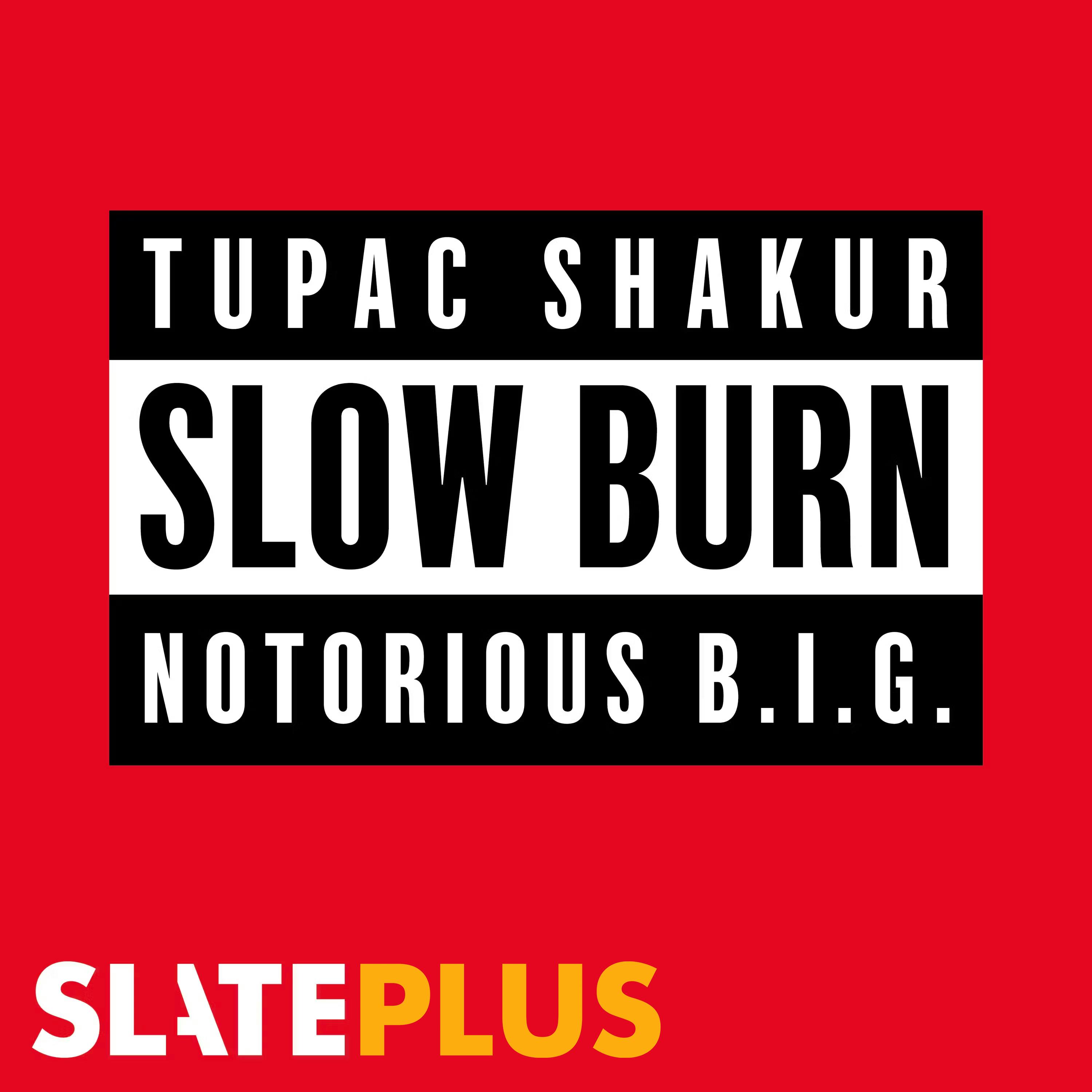
Biggie and Tupac | 7. To Live and Die in LA
This episode is member-exclusive. Listen to it now by subscribing to Slate Plus. By joining, not only will you unlock exclusive Slow Burn episodes, but you’ll also access ad-free listening across all your favorite Slate podcasts. Subscribe now on Apple Podcasts by clicking “Try Free” at the top of our show page. Or, visit slate.com/slowburnplus to get access wherever you listen.
In this week's episode: After Tupac’s murder: Revenge killings in Compton, a day of atonement in Harlem, and Biggie Smalls risks everything by going back to Cali.
Learn more about your ad choices. Visit megaphone.fm/adchoices
07:0611/12/2019
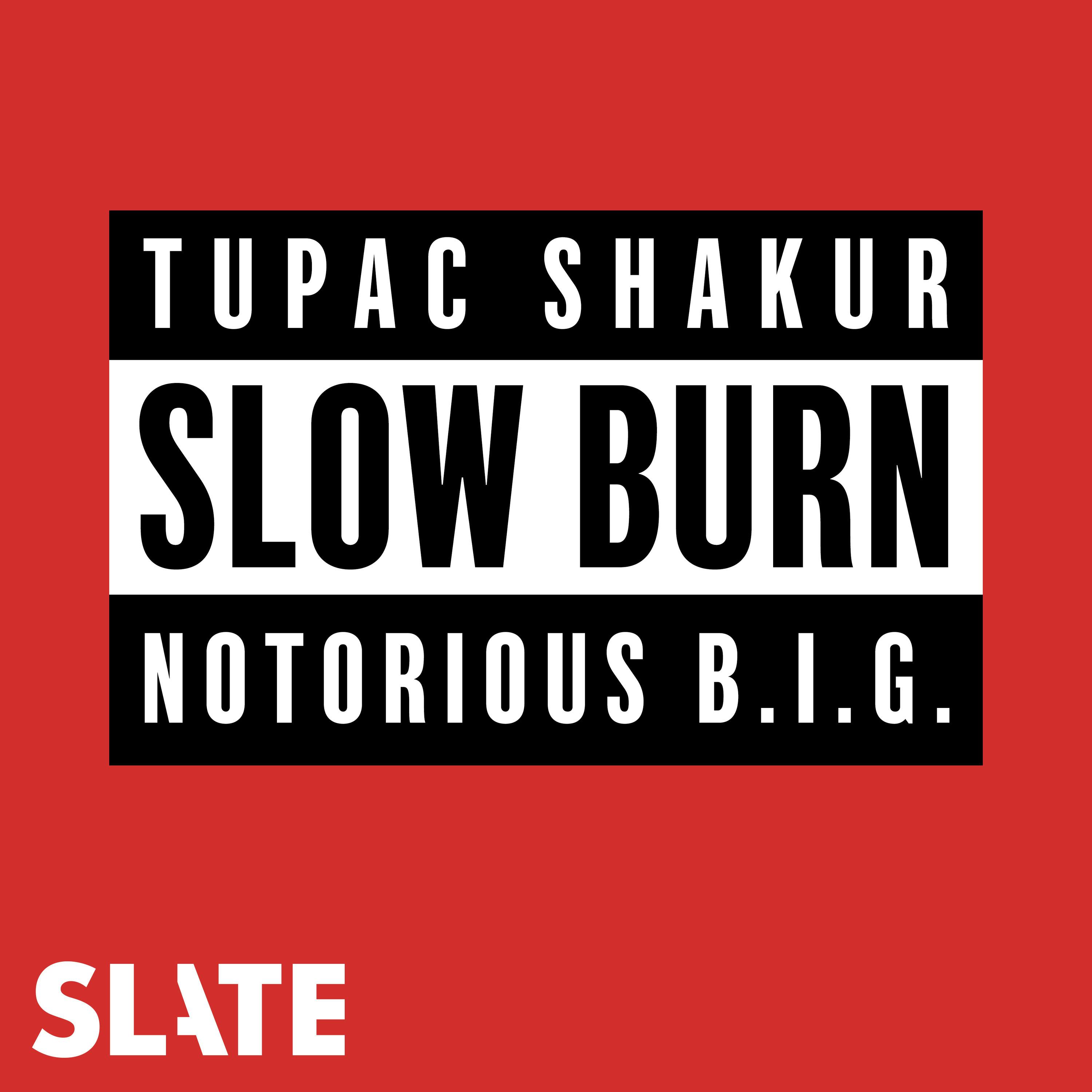
Biggie and Tupac | 6. Til Somebody Kills You
In this episode: In the summer of 1996, Tupac Shakur seemed to be on the verge of a decision—about what kind of career he wanted to have, and what kind of life he wanted to live. And then he went to Las Vegas.
Want more Slow Burn? Subscribe to Slate Plus to immediately access all episodes of Slow Burn (and your other favorite Slate podcasts) completely ad-free. Plus, you’ll unlock subscriber-exclusive bonus episodes that bring you behind-the-scenes on the making of the show. Subscribe now on Apple Podcasts by clicking “Try Free” at the top of our show page. Or, visit slate.com/slowburnplus to get access wherever you listen.
Learn more about your ad choices. Visit megaphone.fm/adchoices
32:0404/12/2019

Biggie and Tupac | 5+. "East vs. West"
In this Slow Burn bonus episode, host Joel Anderson and producer Christopher Johnson discuss the growing feud between Tupac and Biggie and the role of Faith Evans. Then, you’ll hear an extended interview with Larry “The Blackspot” Hester, a former staff writer at Vibe who interviewed Tupac, Biggie, and other people at Death Row and Bad Boy as their drama heated up.
Want more Slow Burn? Subscribe to Slate Plus to immediately access all episodes of Slow Burn (and your other favorite Slate podcasts) completely ad-free. Plus, you’ll unlock subscriber-exclusive bonus episodes that bring you behind-the-scenes on the making of the show. Subscribe now on Apple Podcasts by clicking “Try Free” at the top of our show page. Or, visit slate.com/slowburnplus to get access wherever you listen.
Production by Chau Tu.
Learn more about your ad choices. Visit megaphone.fm/adchoices
01:13:3330/11/2019

Biggie and Tupac | 5. Wrath of a Menace
In this episode: Tupac claims—loudly, publicly, and with very little evidence—that he’s been sleeping with Faith Evans, Biggie’s estranged wife.
Want more Slow Burn? Subscribe to Slate Plus to immediately access all episodes of Slow Burn (and your other favorite Slate podcasts) completely ad-free. Plus, you’ll unlock subscriber-exclusive bonus episodes that bring you behind-the-scenes on the making of the show. Subscribe now on Apple Podcasts by clicking “Try Free” at the top of our show page. Or, visit slate.com/slowburnplus to get access wherever you listen.
Learn more about your ad choices. Visit megaphone.fm/adchoices
34:1827/11/2019

Biggie and Tupac | 4. Against Those Thugs
In this episode: Gangsta rap becomes a huge money maker. Civil rights activist C. Delores Tucker and conservative culture warrior Bill Bennett launch a crusade against offensive lyrics. And hip-hop divides black leaders along generational and gender lines.
Want more Slow Burn? Subscribe to Slate Plus to immediately access all episodes of Slow Burn (and your other favorite Slate podcasts) completely ad-free. Plus, you’ll unlock subscriber-exclusive bonus episodes that bring you behind-the-scenes on the making of the show. Subscribe now on Apple Podcasts by clicking “Try Free” at the top of our show page. Or, visit slate.com/slowburnplus to get access wherever you listen.
Learn more about your ad choices. Visit megaphone.fm/adchoices
33:1020/11/2019

Biggie and Tupac | What's Beef?
In this episode: Biggie releases “Who Shot Ya,” an instant hip-hop classic that Tupac takes as a personal affront. Tupac calls out Biggie and Puffy in a jailhouse interview. And the Death Row and Bad Boy crews start preparing for war.
Want more Slow Burn? Subscribe to Slate Plus to immediately access all episodes of Slow Burn (and your other favorite Slate podcasts) completely ad-free. Plus, you’ll unlock subscriber-exclusive bonus episodes that bring you behind-the-scenes on the making of the show. Subscribe now on Apple Podcasts by clicking “Try Free” at the top of our show page. Or, visit slate.com/slowburnplus to get access wherever you listen.
Learn more about your ad choices. Visit megaphone.fm/adchoices
39:4113/11/2019

Biggie and Tupac | 2. Cops on My Tail
In 1992, Ronald Ray Howard shot and killed Texas state trooper Bill Davidson. His lawyer argued he’d been driven to murder by the music he’d been playing in his car: a dubbed copy of Tupac Shakur’s first album, 2Pacalypse Now.
On the second episode of Slow Burn’s third season: How gangsta rap and law enforcement found themselves at war.
Want more Slow Burn? Subscribe to Slate Plus to immediately access all episodes of Slow Burn (and your other favorite Slate podcasts) completely ad-free. Plus, you’ll unlock subscriber-exclusive bonus episodes that bring you behind-the-scenes on the making of the show. Subscribe now on Apple Podcasts by clicking “Try Free” at the top of our show page. Or, visit slate.com/slowburnplus to get access wherever you listen.
Learn more about your ad choices. Visit megaphone.fm/adchoices
35:5506/11/2019
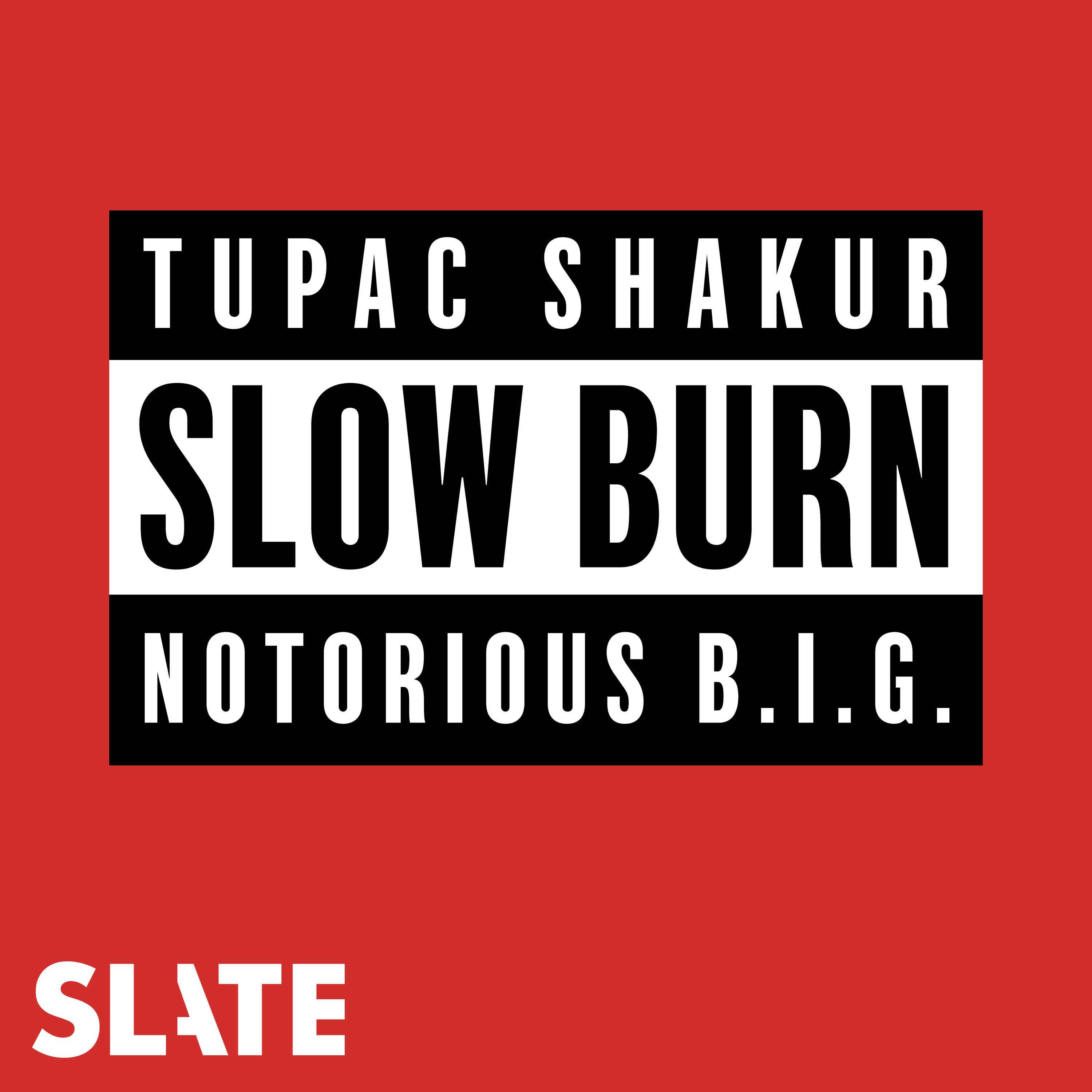
Biggie and Tupac | 1. Against the World
On the first episode of Slow Burn’s third season: How a violent robbery severed Tupac’s friendship with Biggie Smalls and sparked a bicoastal beef that consumed the world of hip-hop.
In November 1994, while on trial for sexual abuse, Tupac Shakur is shot five times in a New York recording studio. In the aftermath, he starts to suspect that his erstwhile friend Christopher Wallace, better known as Biggie Smalls, might be involved. It was the start of a beef that would consume the world of hip-hop and end with both men dead.
Want more Slow Burn? Subscribe to Slate Plus to immediately access all episodes of Slow Burn (and your other favorite Slate podcasts) completely ad-free. Plus, you’ll unlock subscriber-exclusive bonus episodes that bring you behind-the-scenes on the making of the show. Subscribe now on Apple Podcasts by clicking “Try Free” at the top of our show page. Or, visit slate.com/slowburnplus to get access wherever you listen.
Learn more about your ad choices. Visit megaphone.fm/adchoices
35:4330/10/2019

Introducing The Queen
Linda Taylor was a con artist, a kidnapper, maybe even a murderer. She was also America’s original “welfare queen,” the villain Ronald Reagan needed to create a vision of a country being taken advantage of by its poorest citizens. In this new narrative mini-series, Josh Levin, one of the editors behind Slow Burn, reveals the never-before-told story of a woman whose singular life was forgotten in the rush to create a vicious American stereotype.
This podcast is based on Josh Levin’s new book, The Queen: The Forgotten Life Behind an American Myth.
Learn more about your ad choices. Visit megaphone.fm/adchoices
24:4904/06/2019

Slow Burn Live: The Kingdom and the Power
A special edition of Slow Burn features Leon Neyfakh live on stage. In the second of two episodes, Leon was joined in by Emily Bazelon, Wesley Morris, Dan Savage, and Andi Zeisler to explore lingering questions about the Clinton legacy. Plus, Clara Jeffery discusses Hillary Clinton.
Learn more about your ad choices. Visit megaphone.fm/adchoices
57:0305/12/2018

Slow Burn Live: Keyholes
A special edition of Slow Burn features Leon Neyfakh live on stage. In the first of two episodes, Leon was joined in by Ruth Marcus and Rick Perlstein to explore lingering questions about the Clinton legacy. Plus, a story from the season 2 cutting room floor.
Learn more about your ad choices. Visit megaphone.fm/adchoices
58:1728/11/2018

The Clinton Impeachment | 8. Move On
This episode is member-exclusive. Listen to it now by subscribing to Slate Plus. By joining, not only will you unlock exclusive Slow Burn episodes, but you’ll also access ad-free listening across all your favorite Slate podcasts. Subscribe now on Apple Podcasts by clicking “Try Free” at the top of our show page. Or, visit slate.com/slowburnplus to get access wherever you listen.
Juanita Broaddrick told Ken Starr’s team of prosecutors that Bill Clinton had raped her in 1978. Her story wasn’t included in the Starr Report—but members of congress found out about it anyway, and had to decide how it would affect their vote on impeachment. In the final episode of our series on Clinton’s impeachment, Leon Neyfakh talks to Broaddrick, and to Lisa Myers, the NBC News reporter whose interview with Broaddrick became a cause célèbre during the impeachment trial. What does it mean that Broaddrick’s story has never really become a part of Bill Clinton’s?
Learn more about your ad choices. Visit megaphone.fm/adchoices
07:4910/10/2018
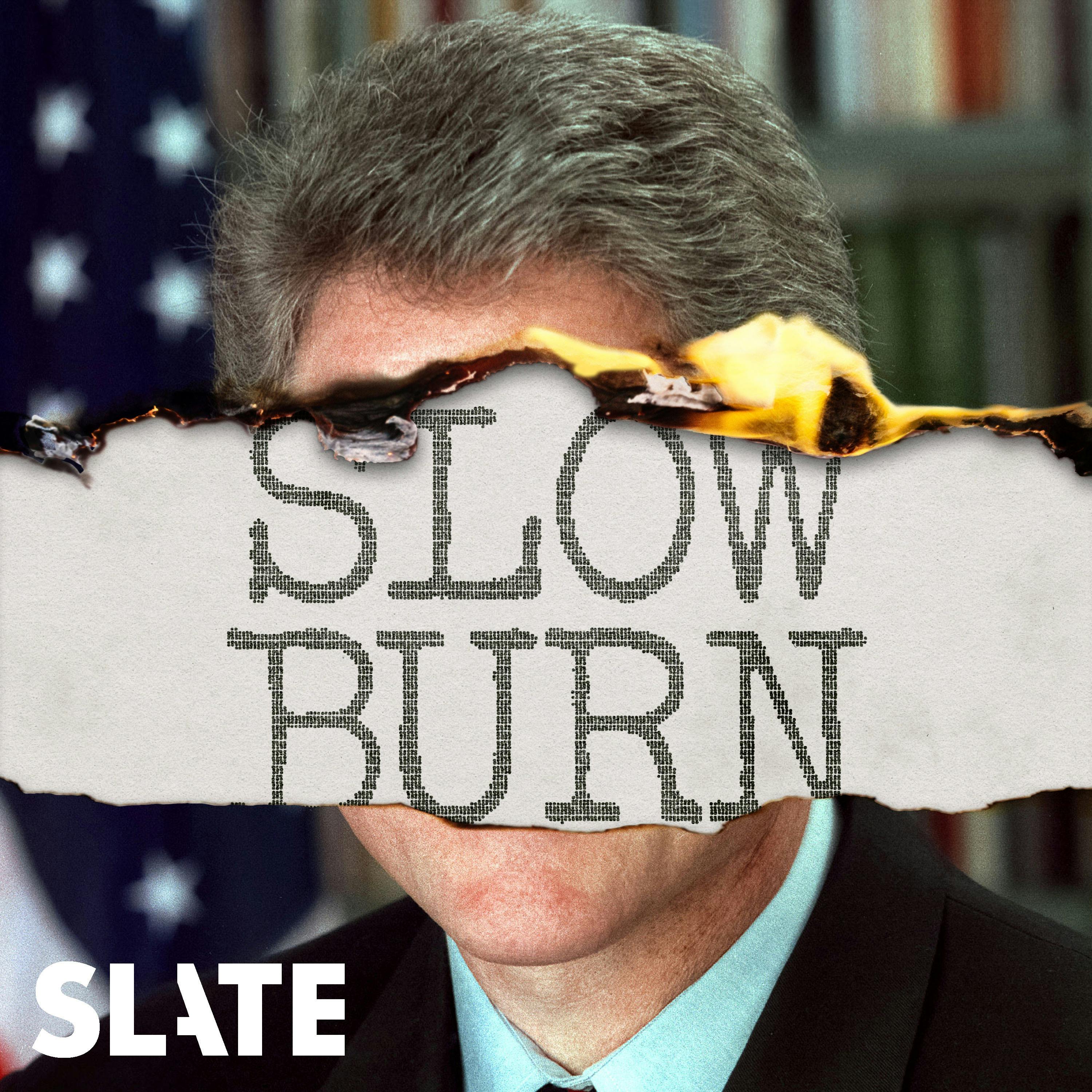
Secret Tracks
Every week, Slate Plus members get a special episode of Slow Burn in which Leon Neyfakh talks to people connected with the Clinton impeachment saga. This week, we’re presenting excerpts from those bonus episodes, featuring interviews with Linda Tripp, consultant Dick Morris, former acting solicitor general Walter Dellinger, and Dillon Teachout, an intern in the independent counsel’s office. Learn more about Slate Plus membership at slate.com/slowburn.
Learn more about your ad choices. Visit megaphone.fm/adchoices
34:2303/10/2018
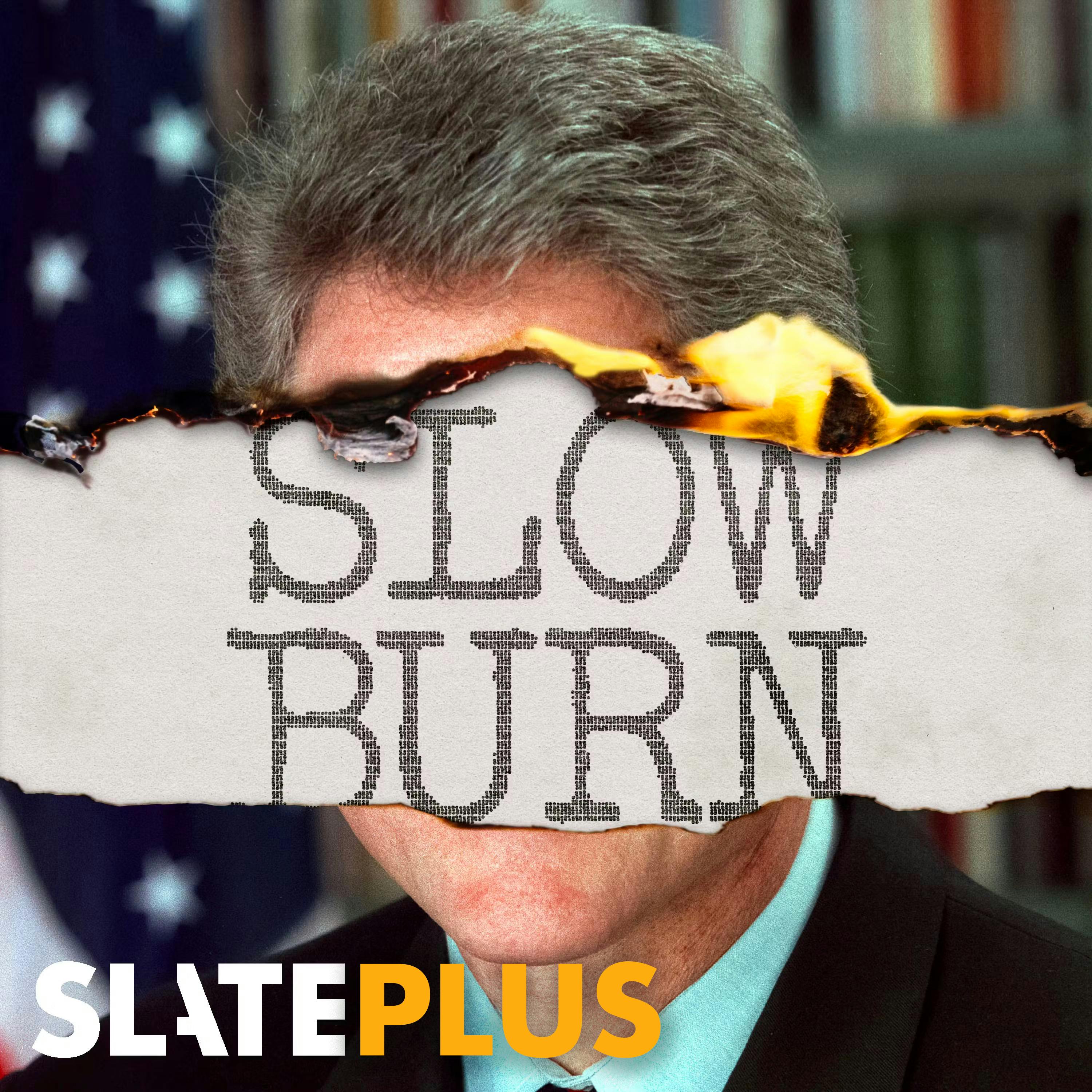
The Clinton Impeachment | 7. Bedfellows
This episode is member-exclusive. Listen to it now by subscribing to Slate Plus. By joining, not only will you unlock exclusive Slow Burn episodes, but you’ll also access ad-free listening across all your favorite Slate podcasts. Subscribe now on Apple Podcasts by clicking “Try Free” at the top of our show page. Or, visit slate.com/slowburnplus to get access wherever you listen.
Today it’s conventional wisdom that all feminists hypocritically turned their backs on Monica Lewinsky. In fact, the scandal provoked an intense debate within the feminist movement about sex, power, and consent. For some, it was obvious that Clinton had victimized Lewinsky and needed to be thrown overboard. For others, it was just as obvious that the scandal was part of a political war in which Clinton was the good guy. In the seventh episode of our series on Clinton’s impeachment, Leon Neyfakh excavates the arguments and ideas that divided liberals—and feminists in particular—at the height of the scandal.
Learn more about your ad choices. Visit megaphone.fm/adchoices
07:3426/09/2018
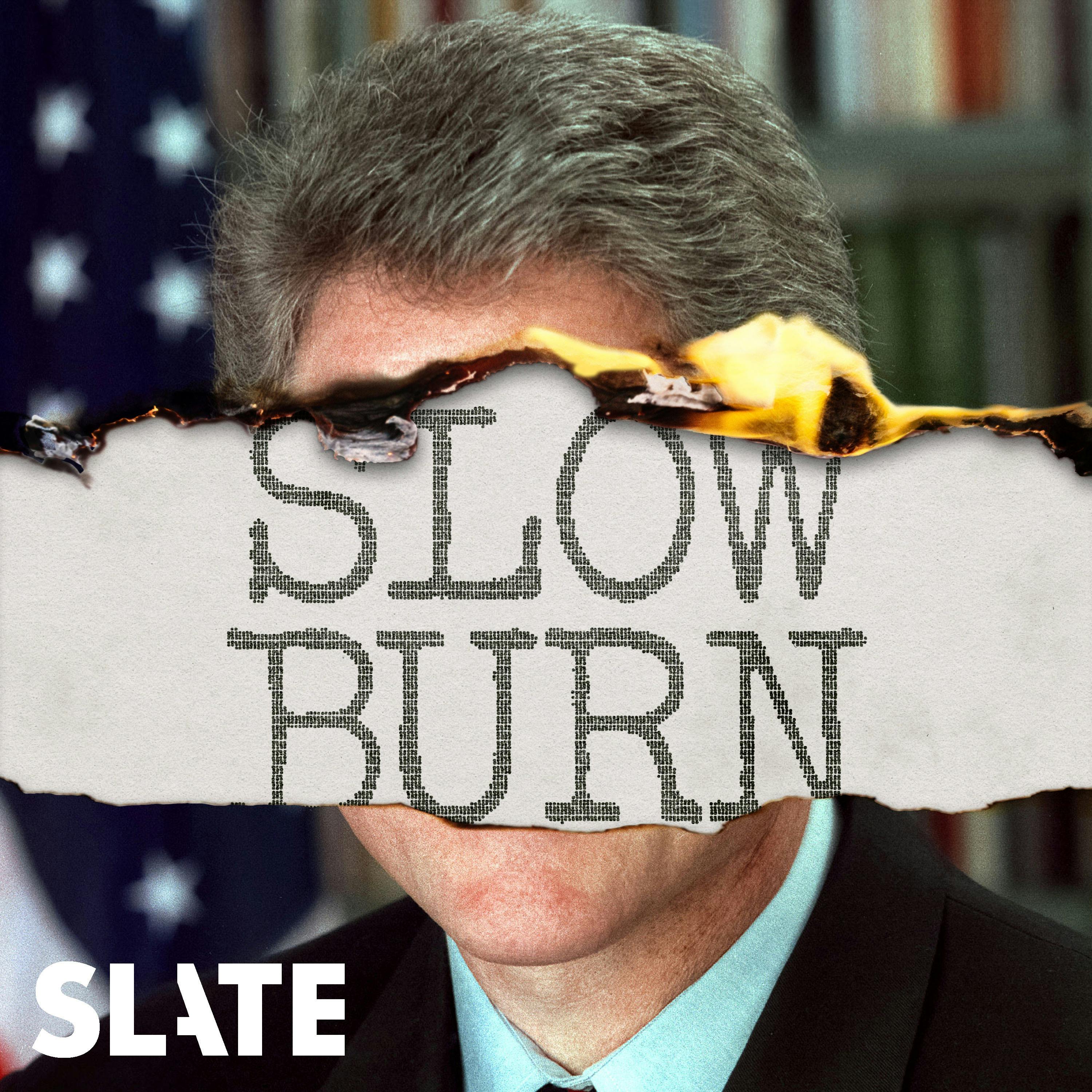
The Clinton Impeachment | 6. God Mode
Some of the most withering criticism of Clinton came from a coalition of conservative activists whose political views were bound up with their faith. The influence of the Christian right within the Republican Party had been growing steadily since the Reagan years. When the Lewinsky story broke, the movement’s leaders pounced on it with righteous vigor.
In the sixth episode of our series on Clinton’s impeachment, Leon Neyfakh charts the religious right’s campaign against the president and how it failed.
Want more Slow Burn? Subscribe to Slate Plus to immediately access all episodes of Slow Burn (and your other favorite Slate podcasts) completely ad-free. Plus, you’ll unlock subscriber-exclusive bonus episodes that bring you behind-the-scenes on the making of the show. Subscribe now on Apple Podcasts by clicking “Try Free” at the top of our show page. Or, visit slate.com/slowburnplus to get access wherever you listen.
Learn more about your ad choices. Visit megaphone.fm/adchoices
52:5719/09/2018
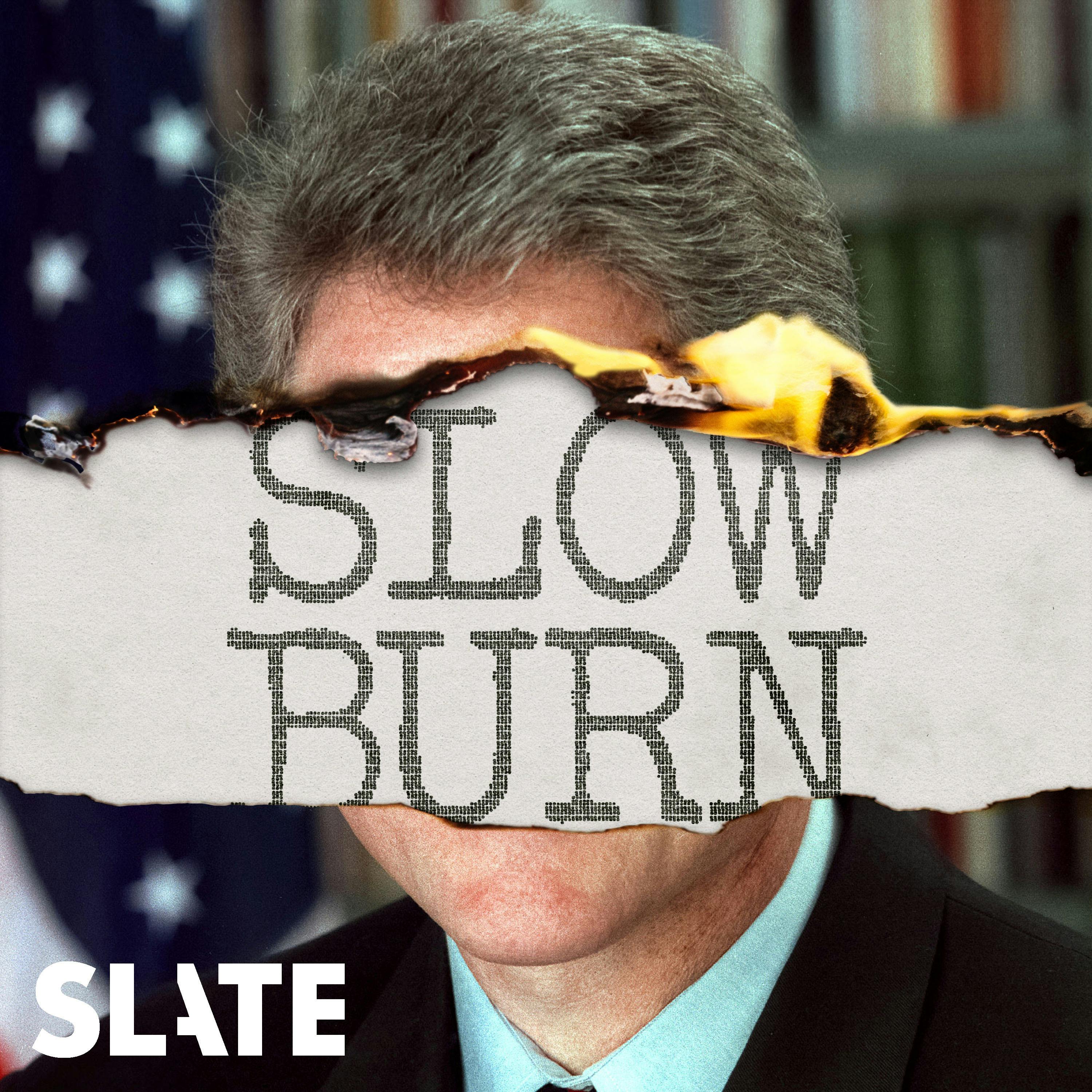
The Clinton Impeachment | 5. Tell-All
Aside from Bill Clinton and Monica Lewinsky, the most pivotal player in the Clinton impeachment saga may have been Linda Tripp—an ordinary person who made extraordinary choices that precipitated the entire crisis. In perhaps the deepest and most intimate interview she’s ever given, Tripp talks to Leon Neyfakh about what she did, and why.
Want more Slow Burn? Subscribe to Slate Plus to immediately access all episodes of Slow Burn (and your other favorite Slate podcasts) completely ad-free. Plus, you’ll unlock subscriber-exclusive bonus episodes that bring you behind-the-scenes on the making of the show. Subscribe now on Apple Podcasts by clicking “Try Free” at the top of our show page. Or, visit slate.com/slowburnplus to get access wherever you listen.
Learn more about your ad choices. Visit megaphone.fm/adchoices
51:4612/09/2018





